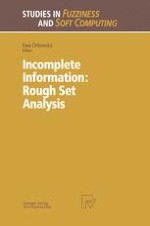1998 | OriginalPaper | Buchkapitel
Similarity versus Preference in Fuzzy Set-Based Logics
verfasst von : Didier Dubois, Henri Prade
Erschienen in: Incomplete Information: Rough Set Analysis
Verlag: Physica-Verlag HD
Enthalten in: Professional Book Archive
Aktivieren Sie unsere intelligente Suche, um passende Fachinhalte oder Patente zu finden.
Wählen Sie Textabschnitte aus um mit Künstlicher Intelligenz passenden Patente zu finden. powered by
Markieren Sie Textabschnitte, um KI-gestützt weitere passende Inhalte zu finden. powered by
There are presently two kinds of fuzzy set-based theories of approximate reasoning: possibilistic logic, and similarity-based logic. This paper is devoted to a comparison between the two lines of research, both at the formal and interpretation level. Similarity calculus, initiated by Ruspini, exploits the idea that interpretations of a formal classical propositional language are more or less close to each other. This is done by equipping this set of interpretations with a metric-like structure, under the form of a fuzzy similarity relation. Then “p approximately implies q” means that p is “not far” from implying q, where “not far” is evaluated by the amount of stretching applied to the models of q so as to make the conditional statement true. On the contrary, in possibilistic logic, the set of interpretations is equipped with a preference relation encoded as a possibility distribution. This possibility distribution expresses that some worlds are more plausible than others. Then “p approximately implies q” means that q is true in the most plausible worlds where p is true. Similarity-based reasoning is also compared with rough set theory, and it is pointed out that while the two approaches are strongly connected at the formal level, the former is devoted to casting interpolation in a logical setting while the latter focuses on incomplete information systems where objects cannot be distinguished.
